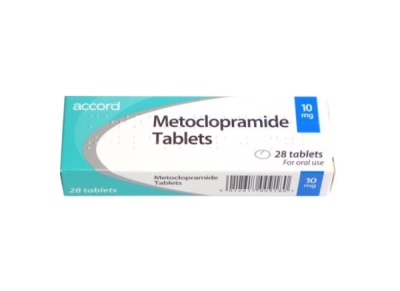Metoclopramide is an anti-sickness medicine that helps to relieve nausea and vomiting. It’s used as an anti-sickness medicine for various reasons such as migraine, radiotherapy or chemotherapy, and after an operation. The active ingredient in the tablets is metoclopramide hydrochloride. Only one strength, metoclopramide 10 mg tablets, are available.
Metoclopramide works by blocking chemical messengers from being received by the part of your brain responsible for vomiting. By blocking these messengers, metoclopramide reduces the sensation of nausea and helps to prevent vomiting.
The recommended metoclopramide dosage is one 10mg tablet taken up to three times a day. You should leave at least 6 hours between doses. This makes sure that you avoid accidentally overdosing. Swallow the tablets with a drink of water.
This medicine is only for short term use and the maximum recommended treatment duration is 5 days. If you miss a dose, skip the missed dose. Do not take a double dose to make up for a forgotten dose.
If you forget to take a dose, take it when you remember, unless it is nearly time for your next dose, in which case leave out the missed dose. Do not take two doses together to make up for a forgotten dose.
Always use this medication exactly as your clinician has told you. Check with our clinical team or your GP or pharmacist if you are not sure.
Medicines and their possible side effects can affect individual people in different ways. The following are some of the side effects that are known to be associated with this medicine. Just because a side effect is stated here, it does not mean that all people using this medicine will experience that or any side effect.
The most common side effects include:
● drowsiness
● diarrhea
● feeling weak
● restlessness
● uncontrollable movements
For full information on side effects and correct use, see the patient information leaflet. If any side effects concern you, or you are experiencing any of the side effects mentioned in the patient information leaflet whilst taking this medication, please contact our clinical team or speak to your GP.
Metoclopramide is not suitable for everyone to take. Anyone who has had a previous allergic reaction to metoclopramide, or any of the other ingredients in the tablets, should not take it.
It should also not be taken if you have bleeding, obstruction or a tear in your stomach. People with health problems like epilepsy, Parkinson’s disease or a history of involuntary muscle spasms should not take this medicine.
Get emergency medical help if you have signs of an allergic reaction to this medication. These include:
● Hives
● Dizziness
● Fast or pounding heartbeats
● Wheezing
● Difficult breathing
● Swelling of your face, lips, tongue, or throat.
It is important that you let us know which prescription, over-the-counter medicines and recreational drugs you are currently taking. You must also tell us about any other medical conditions that you currently have (or had in the past). This will help us ensure the prescribed medication is safe and appropriate for you to take.
For full information on warnings, medication interactions and contraindications, refer to the Patient Information Leaflet. Please read all packaging and the Patient Information Leaflet before taking any new medicine and inform our clinical team or your GP of medicines you are taking or intend to take.







